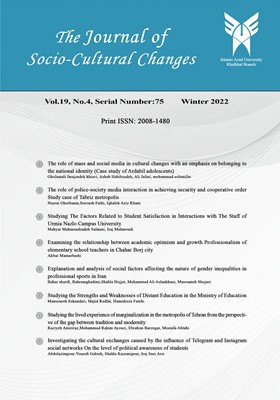Studying the Strengths and Weaknesses of Distant Education in the Ministry of Education
Subject Areas : Development
Mansoureh Eskandari
1
,
Majid radfar
2
*
![]() ,
Hamid reza Fatehi
3
,
Hamid reza Fatehi
3
1 - PhD Student in Sociology, Department of Social Sciences, Islamic Azad University, Roudehen Branch.
2 - Associate professor Département of social Sciences Roudehen university TEHRAN IRAN
3 - Assistant Professor, Department of Social Sciences, Islamic Azad University, Roudehen Branch.
Keywords: Strengths, weaknesses, Distant education,
Abstract :
Distance education or non-attendance education, as a new paradigm in modern education, is a set of educational activities that take place using electronic media and educational technologies in educational institutions and is considered as one of the key learning environments in the information age. Distance education is one of the most important achievements of the information technology era, which has caused a great progress in educational systems. In order to increase their success in education, educational centers have no choice but to adopt a flexible approach with the external environment, i.e. distance education or non-attendance education that is provided in virtual and electronic forms. The purpose of this research is to study the strengths and weaknesses of (SW) non-attendance trainings, to School managers and educational institutions should be helped in adopting appropriate strategies in order to improve education and improve educational performance. The purpose of the current research is to help schools and educational institutions managers adopt appropriate strategies to renovate education and improve educational performance by identifying the socio-economic strengths and weaknesses (SW) of distant education. In order to do so, applying a purposive sampling, the data of 15 individuals including management development assistants, teachers, academic assessment experts and members of parents' and trainer’s associations of the 3rd district of Tehran were collected and analyzed through semi-structured interviews. Applying a grounded theory, studying the strengths and weaknesses of distant education was developed. Findings of this qualitative research show that the correct application of distant education can improve the status and credibility of schools at the Education Association of Tehran, increase intra-school interactions, and increase the satisfaction of parents, students, and teaching staff.
_||_

